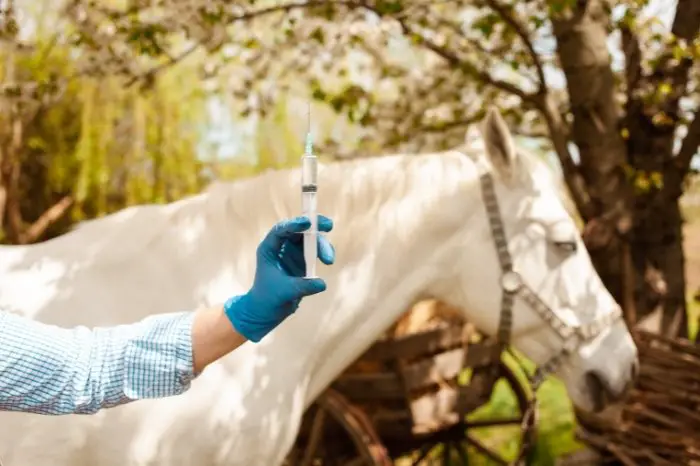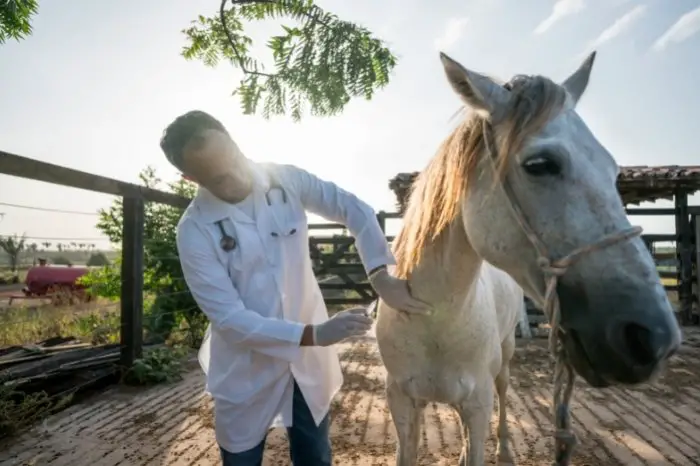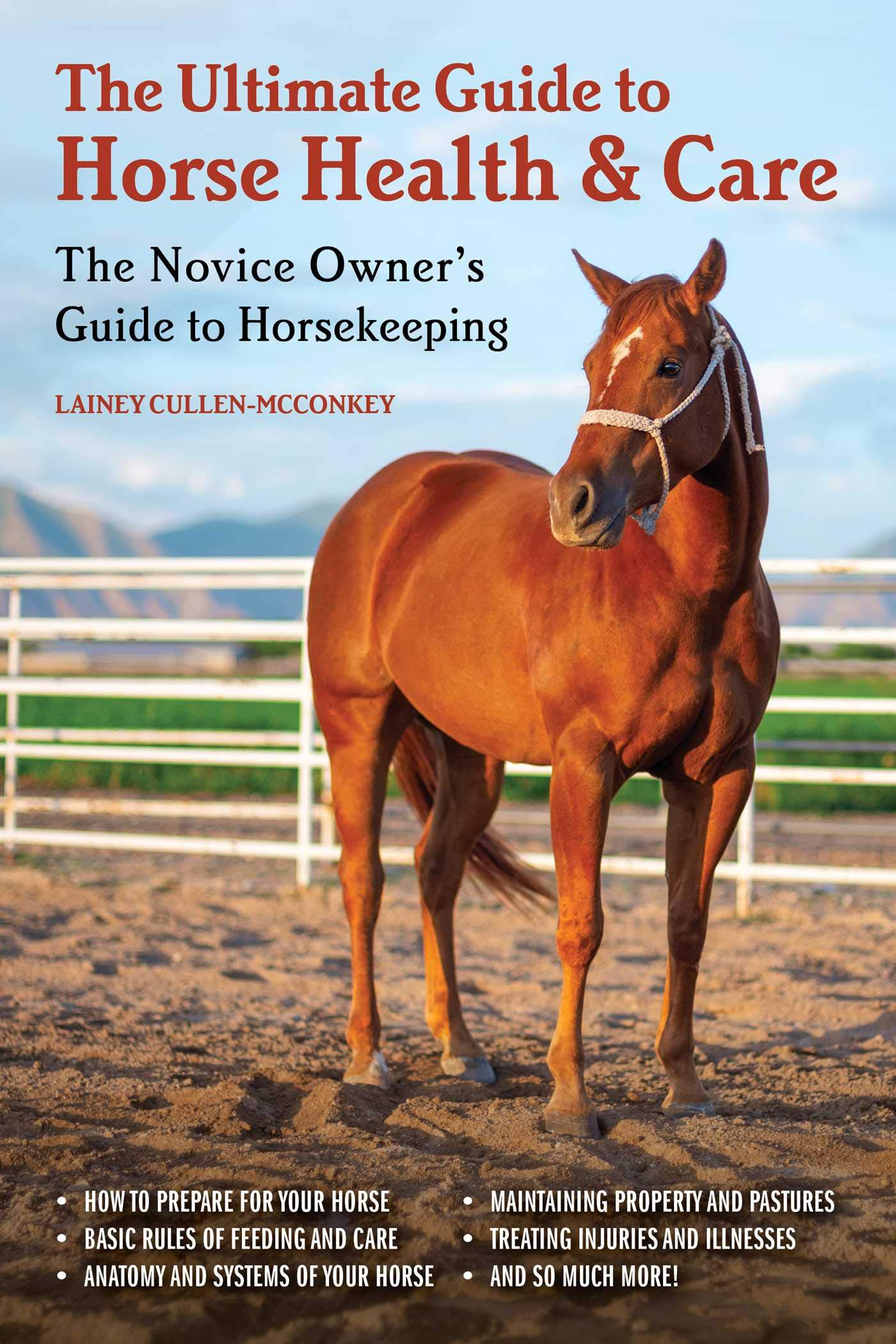Last Updated on December 23, 2021
Before you know it, it will be time for your horse’s spring vaccinations! But when it comes to booking in your veterinarian, how do you know which vaccines your horse needs? And should your horses be getting a rabies vaccine?
The choice of horse vaccinations can be overwhelming, and there is so much conflicting advice about which ones your horse needs. Should you be vaccinating against everything possible, or giving your horse the bare minimum number of shots? Let’s take a look at horse vaccinations and find out what is best for your horse!
What Is A Vaccination?
Vaccinations are given to horses to provide immunity against certain diseases. Normally given as an injection by a veterinarian, vaccinations are sometimes also referred to as inoculations.
To be effective, the timing of vaccinations is very important. They must be given at the correct intervals to be effective, and some need to be administered at certain times of the year.
When vaccination is given it introduces a harmless fragment of a disease-causing pathogen into the horse’s body. This causes a very low-level immune response, and the body creates antibodies against the pathogen. If the horse is exposed to this disease in real life, it is already prepared with the correct antibodies to fight off the pathogens.

Why Should Horses Be Vaccinated?
Vaccinations are essential to protect your horse against some very dangerous and often fatal diseases.
Some of these diseases are transmitted directly from horse to horse, whilst others are passed on by insects such as mosquitoes. Others can be transmitted through contaminated objects, such as feed buckets or human clothing. Some can even be transmitted through rusty objects or the soil.
This means that, even if your horse does not come into contact with other horses, he is still at risk of some disease that can be vaccinated against. And if he has a busy social life, any directly transmissible disease will spread through the equine population like wildfire.
Giving your horse the correct vaccinations at the right times of year is vital to give him protection against several diseases. This also helps to contribute to herd immunity, reducing the overall incidence of the disease and protecting vulnerable horses such as foals and geriatric equines.
When Is The Best Time To Vaccinate A Horse?
It can be so complicated trying to figure out when your horse needs his vaccinations! Some shots need to be administered at specific times of the year. However, others can be given at any time.
The reason for this is that some diseases pose a risk to your horse all year round. This means that it does not matter when the vaccination is given, as long as it is administered within the correct timeframe. So, if it is needed every six months, you need to make sure that this is done on time.
The Ultimate Guide to Horse Health & Care: The Novice Owner’s Guide to Horsekeeping
Some other diseases are seasonal and are more of a risk at certain times of the year. To maximize protection against these diseases, vaccines are administered at a specific time.
For example, most seasonal diseases are spread by mosquitoes. The vaccinations against mosquito-borne diseases are normally administered in the spring, to allow immunity to peak during the early summer.
Most horse owners prefer to get their horses vaccinated just once a year. This means that the seasonal spring vaccinations and core annual vaccinations are combined and given at the same time. Hence the term ‘spring shots’, as that is when most horses are vaccinated!
Is A Rabies Vaccine For Horses Necessary?
The range of diseases that horses can be vaccinated against is huge! If you wanted you could have your horse immunized against all the following diseases:
- Rabies
- Tetanus
- Equine Viral Arteritis
- Equine Encephalomyelitis (Eastern & Western)
- Rotavirus
- Equine Influenza
- West Nile Virus
- Equine Herpes Virus
- Botulism
- Streptococcus Equi
- Potomac Horse Fever
However, vaccinations should only be given if the horse is at risk of contracting that specific disease. We’d all like to wrap our horses in cotton wool and protect them from every risk possible, but it is bad practice to give a vaccination if the horse is unlikely to be exposed to the disease.
For example, in the United Kingdom, rabies has been eradicated. Therefore, horses in the U.K. do not routinely receive rabies vaccinations.
But should your horses have a vaccine for rabies? In the U.S, rabies is endemic in every state. This means that every horse is at risk of contracting rabies, and this disease is always fatal to horses. This is a good reason to ensure that every horse in the U.S is vaccinated against rabies, and your veterinarian will always advise that you get this shot for your horse.
Foals should receive their first rabies vaccination between 4 and 6 months of age. Following this, every equine needs a single dose rabies vaccine to maintain immunity.
If your horse is exposed to a rabid animal and is not vaccinated, he may need to be euthanized. Alternatively, he may need to undergo quarantine for a minimum of 6 months.
A horse that has been vaccinated and is exposed to a rabid animal will be carefully monitored by your veterinarian, but a positive outcome is much more likely.
When Is The Best Time To Give A Horse Its Rabies Vaccine?
Although the rabies shot for horses can be given at any time of year, it is commonly administered in the spring. This is because it is given at the same time as seasonal vaccinations against mosquito-borne disease. The most common form is the 5-way horse shot, which vaccinates against rabies, tetanus, and the most common mosquito-borne infections.

The equine rabies vaccine is also available as a single dose injection. This means that it can be given as a stand-alone vaccine at any time of year, regardless of what other vaccines have already been given.
Summary
So, as we have learned, rabies is endemic in the U.S, and horses in all states should be vaccinated against this disease. The rabies vaccine for horses is often combined to be given at the same time as your horse’s spring shots.
We would love to hear about your experiences with horse vaccinations – do you dread vaccination time? Perhaps you have a new pony and have some questions about vaccinations? Add a comment below this post and we’ll get back to you!

Kate Chalmers is a qualified veterinary nurse who has specialized in horse care for the vast majority of her career. She has been around horses since she was a child, starting out riding ponies and helping out at the local stables before going on to college to study Horse Care & Management. She has backed and trained many horses during her lifetime and competed in various equestrian sports at different levels.
After Kate qualified as a veterinary nurse, she provided nursing care to the patients of a large equine veterinary hospital for many years. She then went on to teach horse care and veterinary nursing at one of the top colleges in the country. This has led to an in-depth knowledge of the care needs of horses and their various medical ailments, as well as a life-long passion for educating horse owners on how to provide the best possible care for their four-legged friends.
Kate Chalmers BSc (Hons) CVN, Dip AVN (Equine) Dip HE CVN EVN VN A1 PGCE

